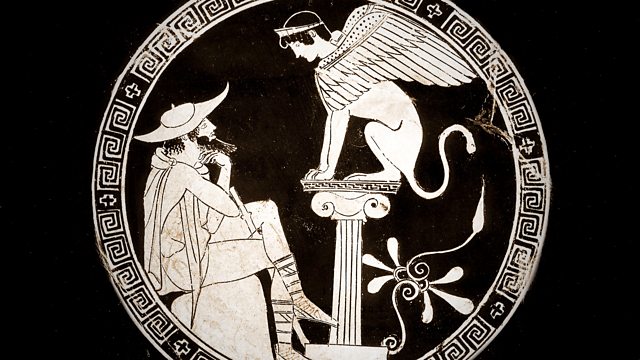Thebes
Melvyn Bragg and guests discuss the myths of the ancient Greek city of Thebes, as told by Athenian dramatists, and the times when Thebes dominated Greek history.
Melvyn Bragg and guests discuss the myths and history of the ancient Greek city of Thebes and its depiction in Athenian drama. In myths it was said to be home to Heracles, Dionysus, Oedipus and Cadmus among others and, in history, was infamous for supporting Xerxes in the Persian War. Its prominence led to a struggle with the rising force of Macedon in which the Thebans were defeated at Chaironea in 338 BC, one of the most important battles in ancient history. The position of Thebes in Greek culture was enormously powerful. The strength of its myths and its proximity to Athens made it a source of stories for the Athenian theatre, and is the setting for more of the surviving plays than any other location.
The image, above, is of Oedipus answering questions of the sphinx in Thebes (cup 5th century BC).
With
Edith Hall
Professor of Classics at King's College London
Samuel Gartland
Lecturer in Ancient History at Corpus Christi College, University of Oxford
and
Paul Cartledge
Emeritus Professor of Greek Culture and AG Leventis Senior Research Fellow at Clare College, University of Cambridge
Producer: Simon Tillotson.
Last on
More episodes
Previous
Next
LINKS AND FURTHER READING
Ìý
READING LIST:
Vassilios Aravantinos, Τhe Archaeological Museum of Thebes (OLKOS, 2010)
Daniel W. Berman,ÌýMyth, Literature, and the Creation of the Topography of ThebesÌý(Cambridge University Press, 2015)
R. J. Buck, A History of Boeotia (University of Alberta Press, 1987)
R. J. Buck, Boeotia and the Boeotian League 432-371 BC (University of Alberta Press, 1994)
John Buckler,ÌýThe Theban Hegemony 371-362 BCÌý(Harvard University Press, 1980)
Lowell Edmunds,ÌýOedipusÌý(Routledge, 2006)
J. Peter Euben (Ed.), Greek Drama and Political Theory (University of California Press, 1988), especially ‘Thebes: Theatre of self and society' by Froma Zeitlin
Mogens Herman Hansen and Thomas Heine Nielsen (eds.), An Inventory of Archaic and Classical Poleis (Oxford University Press, 2004), especially 'Boiotia' by M. H. Hansen
Pindar (trans. Cecil Bowra) The Odes (Penguin, 1982)
Anne Pippin Burnett, Pindar (Bristol Classical Press, 2008)
Nicholas Rockwell, Thebes: A HistoryÌý(Routledge, 2017)
Sophocles (trans. Ruby Blondell, The Theban Plays: Antigone, King Oidipous and Oidipous at Colonus (Focus Classical Library, 2001)
Richard Stoneman, Pindar (I.B. Tauris, 2013)
Credits
| Role | Contributor |
|---|---|
| Presenter | Melvyn Bragg |
| Interviewed Guest | Edith Hall |
| Interviewed Guest | Samuel Gartland |
| Interviewed Guest | Paul Cartledge |
| Producer | Simon Tillotson |
Broadcasts
- Thu 23 Nov 2017 09:00Â鶹Éç Radio 4
- Thu 23 Nov 2017 21:30Â鶹Éç Radio 4
Featured in...
![]()
Ancient Greece—In Our Time
Browse the Ancient Greece era within the In Our Time archive.
![]()
History—In Our Time
Historical themes, events and key individuals from Akhenaten to Xenophon.
In Our Time podcasts
Download programmes from the huge In Our Time archive.
The In Our Time Listeners' Top 10
If you’re new to In Our Time, this is a good place to start.
Arts and Ideas podcast
Download the best of Radio 3's Free Thinking programme.
Podcast
-
![]()
In Our Time
Melvyn Bragg and guests discuss the ideas, people and events that have shaped our world.



